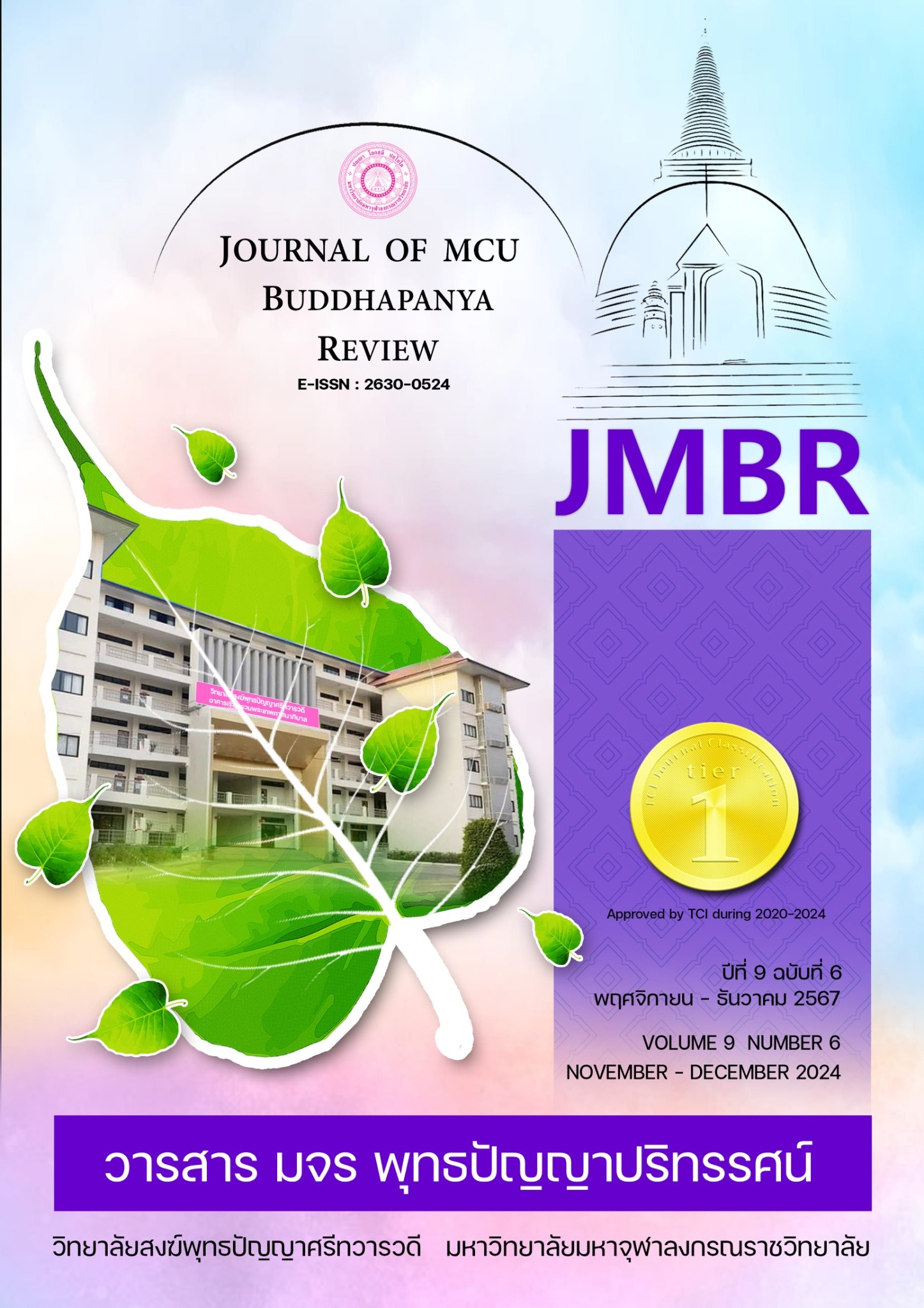กลยุทธ์การบริหารวิชาการสำหรับโรงเรียนประถมศึกษาในฐานวิถีชีวิตใหม่
คำสำคัญ:
Academic administration strategy; New Normalบทคัดย่อ
การวิจัยนี้มีวัตถุประสงค์ เพื่อทราบกลยุทธ์การบริหารวิชาการสำหรับโรงเรียนประถมศึกษาในฐานวิถีชีวิตใหม่ เป็นการวิจัยเชิงอนาคต แบบ EFR (Ethnographic Future Research) ผู้ให้ข้อมูลสำคัญคือ ผู้ทรงคุณวุฒิและ ผู้เชี่ยวชาญ ที่มีความรู้ความเชี่ยวชาญทางด้านการบริหารวิชาการ จำนวน 17 คน ใช้วิธีคัดเลือกแบบแบบเจาะจง (Purposive sampling) เครื่องมือที่ใช้ในงานวิจัยคือ แบบสัมภาษณ์แบบไม่มีโครงสร้าง (unstructured interview) วิเคราะห์ข้อมูลโดยใช้ใช้วิเคราะห์เนื้อหาแล้วเขียนบรรยายเชิงพรรณนา
ผลการวิจัยพบว่า กลยุทธ์การบริหารวิชาการสำหรับโรงเรียนประถมศึกษาในฐานวิถีชีวิตใหม่ ประกอบด้วย 4 กลยุทธ์ คือ 1) กลยุทธ์ด้านนโยบายและแผนงานวิชาการในยุคแห่งการเปลี่ยนแปลง 2) กลยุทธ์ด้านการพัฒนาทักษะและสมรรถนะของบุคลากรบนฐานวิถีชีวิตใหม่ 3) กลยุทธ์ด้านนวัตกรรมและสื่อเทคโนโลยีดิจิทัล และ 4) กลยุทธ์ด้านเครือข่ายการเรียนรู้เพื่อรองรับการเปลี่ยนแปลง
เอกสารอ้างอิง
Anannawee, P. (2014). Principles, Concepts, and Theories of Educational Administration. Chonburi: Montri Publishing Co., Ltd.
Bettina, S. (2019). Creating blended learning experiences requires more than digital skills. Pacific Journal of Technology Enhanced Learning. 2(1), 35.
Duangchurn, P. (2020). Education management accepts the New normal After the Covid-19 Crisis. The Journal of Arts Management, 4(3), 1788.
Maharatanakul, P. (2017). Strategic Planning and Management. Bangkok: S. Asia Press (1989) Co., Ltd.
Ministry of Education. (2002). National Education Act B.E. 2542 (1999). Bangkok: Kurusapa Printing Ladphrao.
Office of the Basic Education Commission. (2010). Basic Education Core Curriculum B.E. 2551. Bangkok: Cooperative Federation of Agricultural Cooperatives of Thailand, Ltd.
Office of the Education Council. (2017). The National education plan B.E. 2017-2036. Bangkok: Prikwarn Graphic Co., Ltd.
Pérez et al. (2022). Educational Strategies During the Covid-19 Pandemic: Systematic Review. Journal of Language and Linguistic Studies, 18(4), 243-251.
Pratoomrat, C. (2021). Learning Skill and the new normal after the COVID-19 crisis 4.0 Education Era. Journal of Educational Administration and Leadership Sakon Nakhon Rajabhat University, 9(35), 1-8.
Rathanit, S. (2017). Theory and Practice of Educational Administration. (Fourth Edition). Bangkok: khaofang Publishing.
Royal Academy. (2022). Newsletter of Royal Academy.Retrieved From https://www.orst.go.th/ FILEROOM/CABROYINWEB/DRAWER004/GENERAL/DATA0000/00000265.FLP/html/8/
Somprach, K. (2017). Leadership and Learning Leadership for School Administrators. Khon Kaen: Klungnana Vitthaya Press.
Thongkaew, T. (2020). New Normal Based Design in Education: Impact of COVID-19. URNAL OF TEACHER PROFESSIONAL DEVELOPMENT, 1(2), 3-4.
Wannasri, J. (2014). Academic Administration in Educational Institutions. Phitsanulok: Rattanasuwan Printing.
Wongyai, W. and Patphol, M. (2020). New normal in Learning. Graduate School of Srinakharinwirot University.
World Economic Forum. (2020). 4 ways COVID-19 could change how we educate future generations 2020. Retrieved 16 March 2021, from https://www.weforum.org/agenda/ 2020/03/4-ways-covid-19-education-future-generations/
ดาวน์โหลด
เผยแพร่แล้ว
รูปแบบการอ้างอิง
ฉบับ
ประเภทบทความ
สัญญาอนุญาต
ลิขสิทธิ์ (c) 2025 วารสาร มจร พุทธปัญญาปริทรรศน์

อนุญาตภายใต้เงื่อนไข Creative Commons Attribution-NonCommercial-NoDerivatives 4.0 International License.



